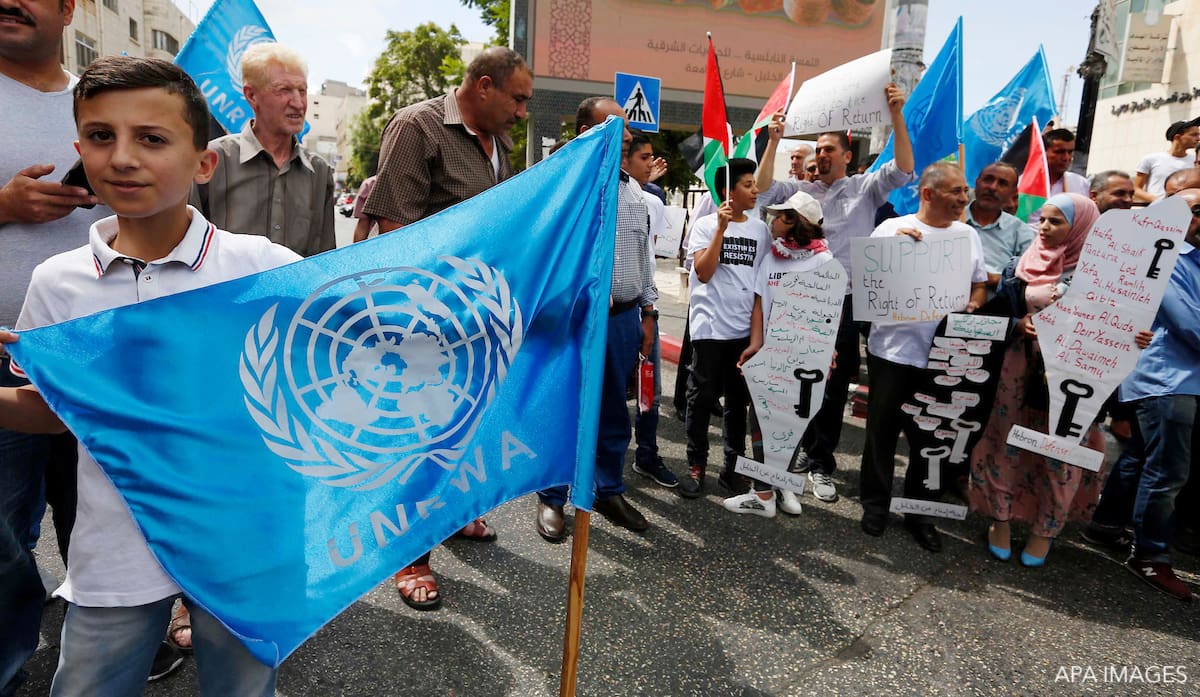
The United Nations Relief and Works Agency for Palestine Refugees (UNRWA) recently launched an appeal for $14 million in anticipation of a coronavirus outbreak in Palestinian refugee camps. It’s an indication of the dire financial straits the agency is in, particularly since the US – once its major donor – cut its annual $360 million donation in August 2018.1
No account can truly capture the increasing suffering those cuts brought on. In the Gaza Strip, for instance – one of the most densely populated places in the world – some 1.4 million out of 2 million people are refugees, and 80% of them depend on humanitarian assistance for their sustenance and livelihood. The cuts have reduced key services, from healthcare to education, accelerating Gaza’s descent into a terrifying dystopia.
New Cuts, Same Policy
Though the 2018 US decision caused an “historical shortfall” in UNRWA’s budget, it did not signal a fundamental shift in US policy. Rather, it represented an upsurge in an ongoing US-Israeli strategy to weaken and ultimately dismantle the agency. Instead of serving as a means to integrate refugees, as was originally intended by Western powers, over the decades UNRWA emerged as a symbol of the Palestinian refugee predicament and a substitute welfare state-in-exile. This is why the agency’s wings are being clipped and its programs targeted.
Over time, and particularly since the Oslo Accords, Israel and the US have aimed to destroy UNRWA’s cultural ethos as it pertains to a collective sense of Palestinian national belonging. They have also worked to drive a wedge between the refugees and the agency, expand monitoring mechanisms to scrutinize and control the agency’s programs as well as its staff, and diminish its standing regionally and internationally.
For years, Israeli lobby groups have pushed Western states to suspend their funding to UNRWA, accusing the agency of anti-Semitism, corruption, and having links to terrorism.2 Donor states such as Canada have responded by conditioning funding on “reform” programs and stricter monitoring procedures. UNRWA usually complies with such demands to secure funding.
Also in response to these pressures, UNRWA has increasingly highlighted concepts such as neutrality, human rights, human development, protection, and gender to emphasize individual and social rights while prohibiting expressions of what it defines as “political.” Former employees of the agency have relayed to this author that warnings and layoffs have occurred in recent years due to employees not expressing themselves “neutrally.” Staff have also been asked to remove pre-1948 Palestinian maps from textbooks and UNRWA facilities, and have experienced monitoring over programs to ensure they contain no criticism of Israel or Zionism.
Palestinians whose voices have been marginalized for too long, especially refugees and the poor, must be encouraged to participate in efforts to reclaim UNRWA Share on XThe separation of the individual from the collective, and defining Palestinian national belonging as a political act that transgresses the agency’s humanitarian mandate, mutes demands for Palestinians’ collective rights. The agency also stresses infrastructural camp improvements and microfinance programs, which are even more clearly linked to a long-term strategy to integrate and resettle refugees rather than empower them and ultimately enable them to implement the right of return.
In Jordan, for example, effective, community-based, and genuinely participatory programs, especially those from the mid-to-late 1980s, have fizzled out and their remnants handed over to the Jordanian state or even contracted out to international organizations. These include the Women’s Program Centers, Youth Programs, and the Community-Based Rehabilitation Program for Persons with Disabilities. These centers served local communities while fostering and protecting Palestinian cultural life and collective identity.
Pushing Back
The US’s defunding of UNRWA and the agency’s disempowering “reforms” reflect the political environment shored up by the Trump administration’s policies, including the “Deal of the Century” and support for Israel’s illegal annexation of Jerusalem, much of the West Bank, and Syria’s Golan Heights. Trump has even decided there are no Palestinians in Jerusalem, only “Arabs” and non-Israelis. This has implications for UNRWA’s operations, because if there are no Palestinians in Jerusalem, there are no Palestinian refugees for whom to provide services. Such a narrative creates a situation more conducive to the threat of a US and Israeli campaign, likely backed by supporters such as Saudi Arabia, to annul UN Resolution 194 (III).
Yet such imperialist outcomes are not inevitable; they can be defeated if there is a strategy. In particular, those Palestinians whose voices have been marginalized and silenced for too long, especially refugees and the poor, must be encouraged to participate in collective efforts to reclaim UNRWA:
- Palestinians in civil society organizations, political parties, and right of return committees must take UNRWA back from those who attempt to instrumentalize it as a mechanism for integration or resettlement. This means mobilizing refugees and UNRWA’s refugee-employees to better coordinate campaigns calling attention to the fact that the agency’s mandate is to provide refugees with humanitarian services until such a time as a just durable political solution has been reached that includes repatriation as an option.
- Legal centers and experts in international law should develop a unified strategy to intervene in international fora to preempt anti-UNRWA campaigns.
- Palestinian progressive forces and right of return committees and campaigns must consolidate efforts to counter malicious rumors and ideas about UNRWA.
- Palestinians should oppose donor-imposed conditions on UNRWA that violate refugee rights, such as the rights of refugee children to learn in UNRWA-run schools about their pre-1948 histories and about their inalienable rights, such as the right of return.
- Palestinians must also question more thoroughly why so much UNRWA funding goes into “neutrality” or “human rights” workshops, as well as “monitoring,” and should work to change this use of funding to address the fact that many refugee families are in dire need of such resources for basic health or relief services.
- To read this piece in French, please click here. Al-Shabaka is grateful for the efforts by human rights advocates to translate its pieces, but is not responsible for any change in meaning.
- See, for example, one of the more recent attempts by B’nai B’rith Canada calling for suspending funding to the agency due to “corruption.”
Randa Farah is an Associate Professor at the University of Western Ontario, Anthropology Department. Dr. Farah has written on Palestinian popular memory and reconstructions of identity based on her fieldwork in a refugee camp in Jordan. She was a Research Associate at the Centre d’Etudes et de Recherches sur le Moyen-Orient Contemporain (CERMOC), in Jordan, where she conducted research on Palestinian refugees and the United Nations Relief and Works Agency (UNRWA). She held different positions as Visiting Fellow and an Associate Researcher at the Refugee Studies Center (RSC) at the University of Oxford.










